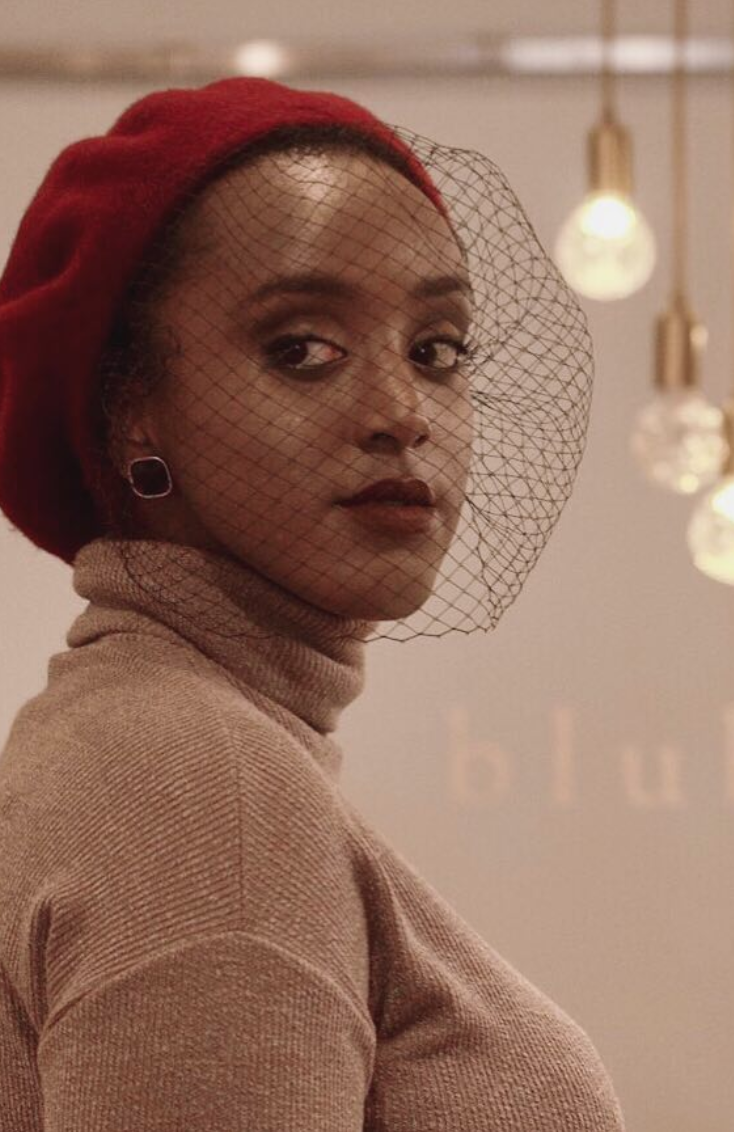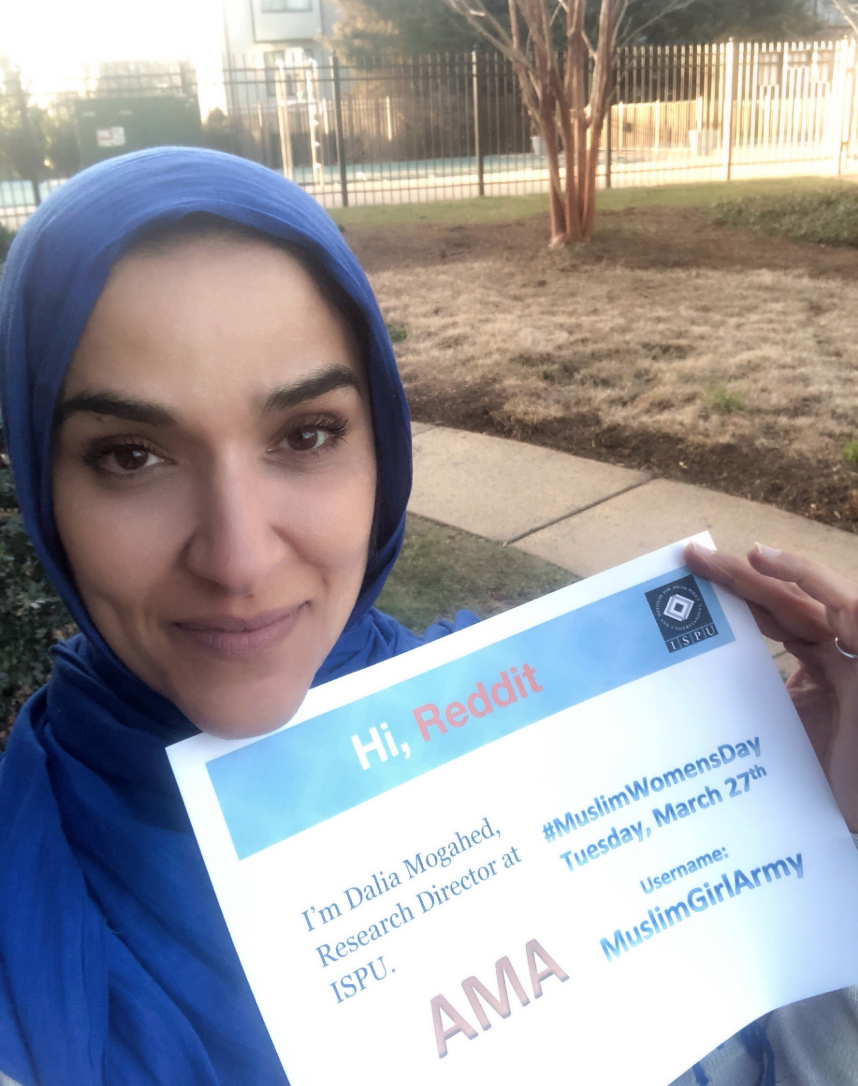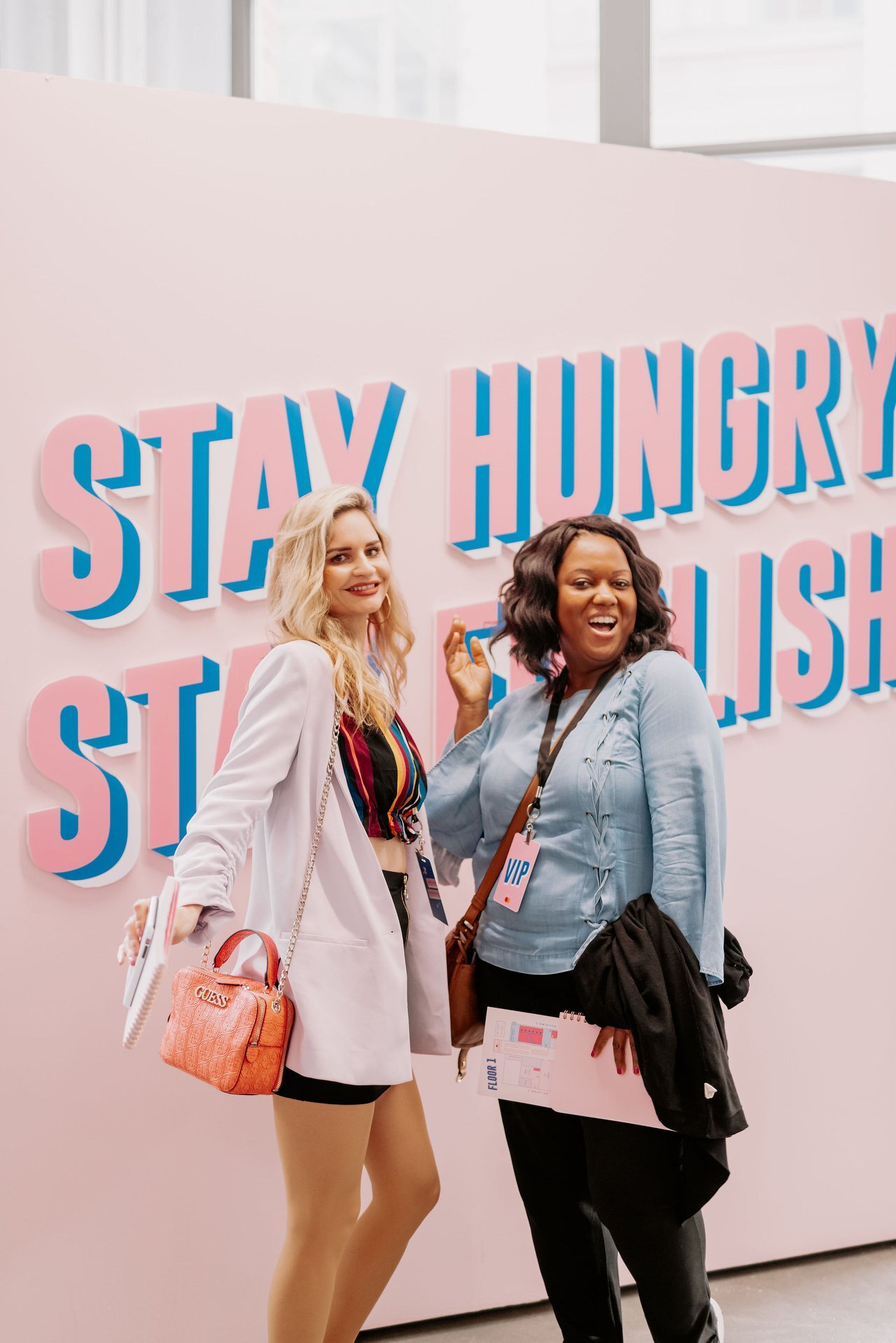It’s #MuslimWomensDay, a day for celebrating Muslim women around the world and giving them the spotlight to share their stories. Since 2000, there has been a 50% increase of Muslim women in the workforce across the globe. But 61% of US-born Muslims say they have experienced discrimination at least once in their lifetime, and 68% of Muslim women believe the way the Media depicts Muslims is “unfair.”
Below, we spoke with Eman Idil Bare and Dalia Mogahed about their experiences being Muslim women in America, microaggressions in the workplace, and what non-Muslims can do to be better allies to the Muslim community.
Eman Idil Bare
Journalist, Fashion Designer, Law Student
What do you do for a living? Tell us about your career journey.
Haha, this question always stresses me out! I do a lot. I am a journalist first and foremost. I primarily work on longform investigative stories, but I also write a lot of fashion features for some semblance of balance.
Then I am a fashion designer. And most recently, a law student. To some people, my career journey might seem a bit...scattered. But there is a reason and a purpose, I promise! The nucleus of everything I do is social change. I went to journalism school because I did not like the way people who looked like me had their stories told. But working as a journalist showed me that the problem was much bigger than how a reporter told a story. And it seemed like the only way I could really grow my career was by selling myself as a “hijabi” reporter. Frustrated, I decided to take a break from journalism...and go to fashion school. I needed time to think my next few steps, and school was my comfort zone. And it was the best decision I ever made.
I was able to reground myself and figure out my purpose. That led me to launching my fashion line, and those experiences led me to law school. The most important lesson I have learned in my life is that nothing has to be linear.
You hired all black models for your runway debut at NYFW—and the show was amazing! Tell us about that experience.
I wanted to build my own table. I am at a point in my life where I am able to create the things that I once advocated for. I am tired of asking for inclusion from the fashion industry, or from any industry. I think that any brand that does not have employees that reflect the markets they cater to are making that decision intentionally. I did not see women who looked like me on runways as a child, so I decided to make my own brand because I deserve to be represented.
The experience was life changing. I loved seeing how happy my models were to notice that they had men and women doing their hair who actually knew how to care for black hair. It was the first time most of them walked in a show and did not feel like an afterthought. In 2019, models needing to bring their own makeup to shoots isn’t “unfortunate,” it’s racist. And we need to address it as such.
What are some of the microaggressions you’ve personally faced as a Muslim woman in the workplace?
This is an email that the communications director of a school board in Ontario sent me:
I think what a lot of people fail to understand is that my entire existence, as a black Muslim woman, threatens a lot of people’s sense of privilege. People really think that Muslim women are oppressed, or black women are inferior. Because of the nature of my work, a lot of the people I interview are men in positions of power. They aren’t use to someone who looks like me holding them accountable. And a lot of the times, they snap. This is email. And they expect me to back down. But Somali women aren’t known to be passive, and I am loyal to my roots.
Also - shout out to Terry. If you’re reading this: No, you can’t “speak to my manager.”
Do you think things are getting better or worse for Muslim women in the workplace, and what factors contribute to this?
I think we need to remember that there are different kinds of Muslim women. A lot of Muslim women are white passing. And a lot of Muslim women don’t wear hijab. So, for some Muslim women, I think their privilege allows them to benefit from their proximity to whiteness.
Black Muslim women will always carry the weight of being Muslim and Black. And yes, I think it is getting much harder for us. And I think it is the responsibility of non-black Muslim women to ensure that it gets better for all of us. Which sometimes just means reminding the world that there are Muslims who have to deal with Islamophobia, and anti-blackness.
The contributing factor? A racist President and the white supremacy that fuels him.
What can non-Muslim women do better to support their colleagues in the workplace?
Honestly, acknowledging that we are not a homogenous group. And that even though we are Muslim women, we still have individual personalities. I think that gets lost a lot. That we are our own person. “What do Muslim women need” is as difficult to answer as “what do white women need.” The most important thing anyone can do is acknowledge that.
What advice would you give to another Muslim woman who might be facing adversity in her workplace?
I think sometimes as Muslim women, or as marginalized women, we can be too forgiving. It takes zero effort to be a good person, or to treat another human being like a person. Do not blame yourself, and do not think you need to change who you are to accommodate a workplace that does not value you.
Dalia Mogahed
Director of Research
What do you do for a living? Tell us about your career journey.
I help build bridges and strong communities with research. The formal job title is “Director of Research” at The Institute for Social Policy and Understanding. I am here after my time at Gallup heading Muslim studies there. Before that I was pursuing my MBA at the University of Pittsburgh. I am grateful to be paid to do what I love.
Your TED Talk, What It’s Like To Be Muslim In America, was one of the most-watched talk of the year. Why do you think it resonated so well with its audience?
I’m really taken aback by the success of the talk and so grateful that folks find it resonates. I had hoped to reach people’s hearts with my story and weave the power of the facts about Muslim Americans into that personal narrative. I think our current political moment has a lot of people searching for that human story, and for facts to replace the fear we are fed in so much of our political discourse. I’m so grateful for the opportunity to share my story and research.
You lead research and thought leadership programs for ISPU. What are some of the most interesting or surprising findings you’ve come across in your work?
How much time do you have? Our discoveries are constantly surprising me, even though I’ve been at this for nearly two decades. We discovered for example that American Muslims are the most likely faith community to condemn violence targeting civilians, contradicting Islamophobic tropes about the community. We also found that mosques are a source of moderation, where frequent attendance is linked to greater civic engagement and service to society. We found that Muslim women surpass their male counterparts in education, and what truly oppresses them is not their faith or hijab, but Islamophobia and racism. We also found that Islamophobia is bad for everyone who cares about freedom and safety in America. The more the public is led to endorse Islamophobic tropes, the more they also support violence targeting civilians, authoritative policies and discrimination against Muslims. We also discovered that though white supremacist are responsible for the majority of American casualties at the hands of ideologically motivated violence, Muslim alleged perpetrators receive 770% more media coverage for foiled plots compared to white nationalists.
“Hijab is an issue of religious freedom and freedom of expression and the liberal position should be to defend a woman’s right to choose or not choose it.”
What are some of the microaggressions you’ve personally faced as a Muslim woman in the workplace?
I have been blessed with mostly supportive and inclusive work environments in my career. Where microaggressions come in are more often from random people in the public, or online, where I’ve endured literal campaigns of hate targeting me. In the public, microaggressions often take the form of passive aggressive “pity” for me as a hijab-wearing Muslim woman. The assumption is that some man forced me to dress this way, or that I was brainwashed or socialized into “accepting second-class status” as one woman put it. To me, assuming covering is oppressive is itself extremely misogynistic. It unconsciously is built on the idea that a woman’s power stems from her physical allure versus her intellect, and therefore by covering her physical self she is “oppressed.” Yet, when men are fully covered no one says they are oppressed. I find that extremely problematic. I of course know that some women are forced to wear hijab, and that hijab is sometimes politicized, and this is absolutely wrong. But just because something is sometimes forced on women doesn’t make it inherently oppressive even when freely chosen.
Imagine applying this logic to sex. Women are sexually assaulted in staggering numbers all over the world. Human trafficking is a global industry of billions of dollars. Rape is a weapon of war. But this does not make sex inherently oppressive to women when freely chosen. Imagine a campaign to ban women from having sex in order to “liberate” them? It would sound absolutely ludicrous to most people and banning hijab to liberate Muslim women should sound equally ludicrous. According to ISPU research the vast majority of American women who are Muslim and wear hijab chose to do so. The majority say it is an act of religious devotion or an expression of identity. Hijab is an issue of religious freedom and freedom of expression and the liberal position should be to defend a woman’s right to choose or not choose it.
Do you think things are getting better or worse for Muslim women in the workplace, and what factors contribute to this?
As a cautious optimist, I think things are getting better. I say that because we now have a language for calling for equality. We have laws and precedents to respond to discrimination. We have growing public awareness of the reality of anti-Muslim discrimination, and this wasn’t the case even 10 years ago.
What can non-Muslim women do better to support their colleagues in the workplace?
Women of all faiths and no faith should see each other as partners. This means listening, getting to know each other as people, bragging about each other’s work, and amplifying each other’s ideas. It also means interrogating our unintended biases and asking sincere questions rather than assuming.
What advice would you give to another Muslim woman who might be facing adversity in her workplace?
I actually get this question on a very regular basis, sadly. My advice is never ever assume the whole world is against you. Look for allies, don’t isolate yourself or believe the hate is the majority, because we know it’s not from rigorous research. Most Americans want to live in a country where no one is targeted for their religious background. If the issue is a legal one, don’t be afraid to take legal means to address it if all other attempts at addressing it out of court have failed. The most important thing is to surround yourself with people who love you and who support you. Take care of yourself emotionally and spiritually. Don’t let hostile people penetrate your heart.













